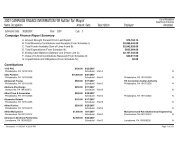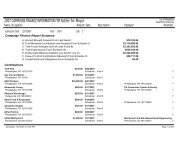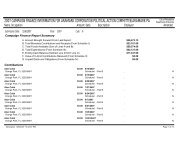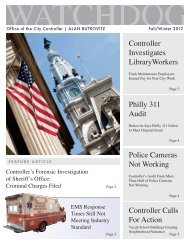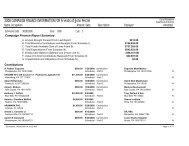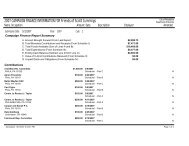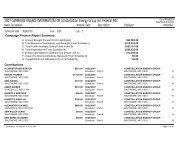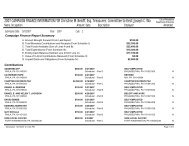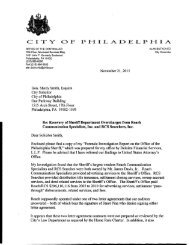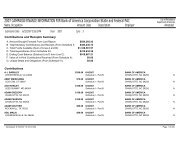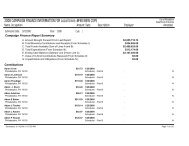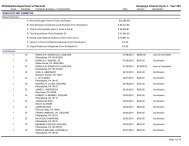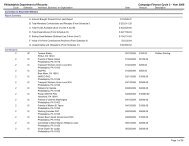department of revenue tax discovery program action steps to
department of revenue tax discovery program action steps to
department of revenue tax discovery program action steps to
You also want an ePaper? Increase the reach of your titles
YUMPU automatically turns print PDFs into web optimized ePapers that Google loves.
FINDINGS AND RECOMMENDATIONS<br />
“Best Practice” — Develop Leads for Non-filers As Part <strong>of</strong> Tax<br />
Compliance Audit Function<br />
The search for unregistered <strong>tax</strong>payers ought <strong>to</strong> be a routine procedure<br />
conducted as part <strong>of</strong> every <strong>tax</strong> compliance audit. As part <strong>of</strong> the audit<br />
work, <strong>revenue</strong> examiners should review and analyze auditee contract<br />
relationships with third parties, including their vendors. Tax audi<strong>to</strong>rs<br />
for the City <strong>of</strong> Seattle, WA, for instance, conduct what its<br />
management refers <strong>to</strong> as the “package audit.” The “package audit”<br />
approach requires Seattle’s <strong>tax</strong> audi<strong>to</strong>rs <strong>to</strong> identify potential<br />
unlicensed <strong>tax</strong>payers routinely as part <strong>of</strong> their audits. Once audi<strong>to</strong>rs<br />
identify potential unregistered <strong>tax</strong>payers, they validate the fact and<br />
follow-up by contacting the <strong>tax</strong>payers <strong>to</strong> gain an understanding <strong>of</strong><br />
their business activities. Audi<strong>to</strong>rs make a decision based on the<br />
Seattle <strong>tax</strong> code; if subject <strong>to</strong> business license and <strong>tax</strong> requirements,<br />
they secure financial data from the unlicensed <strong>tax</strong>payer and prepare a<br />
<strong>tax</strong> assessment.<br />
Findings<br />
The City’s DOR audi<strong>to</strong>rs do follow best practice <strong>to</strong> some extent. We<br />
were informed that as part <strong>of</strong> a <strong>tax</strong> compliance audit, DOR audi<strong>to</strong>rs<br />
routinely research auditee subcontrac<strong>to</strong>rs <strong>to</strong> identify those that may<br />
not be licensed <strong>to</strong> do business in Philadelphia. When audi<strong>to</strong>rs<br />
discover an unlicensed <strong>tax</strong>payer, the audit unit helps the <strong>tax</strong>payer<br />
obtain a license and then assesses it any appropriate <strong>tax</strong>es that need <strong>to</strong><br />
be paid. Beyond searching for unlicensed subcontrac<strong>to</strong>rs, however,<br />
DOR audi<strong>to</strong>rs do not routinely look for other possible third party<br />
relationships, such as vendors or related party associations.<br />
The DOR’s audit unit did not keep statistics, nor provide any <strong>to</strong> the<br />
Tax Discovery Unit, on the results <strong>of</strong> its routine <strong>discovery</strong> searches<br />
for subcontrac<strong>to</strong>rs that had no business privilege licenses. It did not<br />
have data, for example, on the number and kinds <strong>of</strong> subcontrac<strong>to</strong>rs its<br />
audi<strong>to</strong>rs had discovered, or the outcomes <strong>of</strong> further audit work<br />
involving the subcontrac<strong>to</strong>rs.<br />
Recommendation<br />
We commend the DOR for its routine search for unlicensed<br />
subcontrac<strong>to</strong>rs as part <strong>of</strong> the <strong>tax</strong> compliance audit function. We<br />
suggest that it consider expanding its procedures <strong>to</strong> pursue other<br />
16



